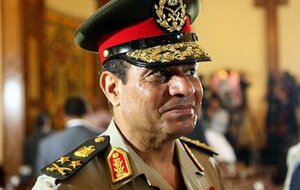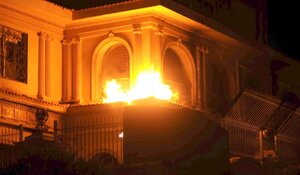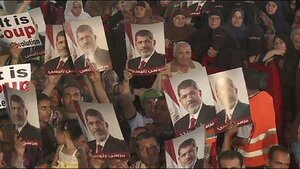
The Independent Analytical Center for Geopolitical Studies “Borysfen Intel” affords ground to the analysts generation for expressing their point of view regarding the political, economic, security, information situation in Ukraine and in the world in general, according to their personal geopolitical studies and analyses.
Note that an authors’ point of view
|
Oleksiy Volovych
The author of the material that we are offering to our readers is a former military serviceman, a graduate of the Faculty of Oriental Languages of the Moscow Military Institute of Foreign Languages. At one time he served as a military translator in Egypt, Iraq, Libya, the UN Forces of peacekeeping in Bosnia and Herzegovina (UNPROFOR).Is engaged in scientific activity, Candidate of Historical Sciences. For some time he worked at the Ukrainian Embassy in Lebanon as Secretary for Political Affairs. Now Oleksiy Volovych is a leading researcher of the Odessa branch of the National Institute for Strategic Studies. He speaks English, Arabic and its dialects.
Egypt: Revolution or a Military Coup? Part 2
“A State within a State”
During Hosni Mubarak's governing, the largest army in Africa (440 thousand people) had expanded its presence in the government and in the economy. From 1997 to 2010, the budget of the Armed Forces of Egypt had risen from 2.6 to 4.5 billion US dollars. During the last 40 years, the Egyptian Army annually received 1.3 billion US dollars of financial assistance from the USA. Some analysts point out that high Egyptian officers are engaged in business more than in combat training. The Army leadership has the right to dispose of the profits of enterprises of the “war economy”, whose share in GDP is on average 30 to 40 %. Adopted in December 2012 Constitution retained all the privileges of the Army.
|
Note: In addition to high salaries, Egyptian officers traditionally have a variety of financial incentives and preferences, live in spacious service apartments, with subsidies to pay for them. Officers of higher rank can purchase a luxury apartment for a concessional loan — 10% of their value. Generals preside in dozens of large enterprises and companies that produce not only military equipment and weapons, but also consumer goods, most of which is sold to servicemen on reduced prices in military stores. Moreover, the military are presented in construction firms, creating municipal infrastructure. They own large agricultural farms and an extensive network of stores. It should be noted that the military and economic activities of Egyptian officers do not fall under the state accountability and control. Even former President M. Morsi was forced to agree to the requirements of the military not to install civilian control over the military budget. |
From the first weeks of his term as President, M. Morsi tried (as it turned out — to no avail), to take control of the Armed Forces. First of all, he sacked the Defense Minister Marshal Hussein Tantawi, Chief of Staff General Sami Anan, and some other generals. In an effort to alternate the “stick” and “carrot”, in April 2013 M. Morsi announced the title of “Corps General” for three two-star Generals.
|
Note: Colonel-General Abdel Fattah al-Sisi was born in Cairo on November 19, 1954. After graduating in 1977, from the Egyptian Military Academy he served in infantry. Was promoted to the post of Commander of Mechanized Forces. He also served as Chief of Security and Intelligence of the Secretariat of the Ministry of Defense, was a Military Attaché in Saudi Arabia, led the Military Intelligence. In 2006, General al-Sisi was trained in the Army Military College in Carlisle, Pennsylvania. Egyptian press has written extensively about the General's connections with American diplomats and the military. August 12, 2012 President M. Morsi appointed Major General Abdel Fattah al-Sisi the Defense Minister, and, bypassing the rank of Lieutenant-General, awarded him the rank of Colonel-General. French “Le Figaro” characterized General al-Sisi as “a nationalist and conservative, a supporter of the country's stability and the strategic alliance with the United States, a fan of Gamal Abdel Nasser”. |
 |
|
Abdel Fattah al-Sisi, Egypt's Minister of Defence, Colonel-General http://ru.tvi.ua/ |
General al-Sisi had been known as an ideological supporter of Islamists, but in June 2013 he suddenly changed his image by having supported the opposition demonstrators. The military coup in Egypt has demonstrated that today, as in the last 60 years, the army is the main political force in the country. The Generals had just been waiting for an opportunity to demonstrate — “Who's the Boss.” Today, Egyptian Generals claim that on the 3rd of July, 2013 there was no military coup, explaining that, the Army, firstly, just had to interfere into the events, in order to prevent a civil war; secondly, the military do not hold any government and state posts; thirdly, the Army is supported by the majority of Egyptian people, as in a total chaos it alone is able to withstand the rapid growth of crime and terrorism. According to the Ministry of Internal Affairs of Egypt, in 2012 the number of murders across the country increased by 30 %, burglaries and robberies — by 250 %, kidnappings — by 45%.
Chronicle of the military coup
 |
|
Opponents of Egyptian President Mohamed Morsi broke into the headquarters of the “Muslim Brotherhood” movement in Cairo http://rus.ruvr.ru/ |
Since June 26 almost the entire country had been shaken by bloody clashes between opponents and supporters of President Mohamed Morsi. The morning of June 30, the anniversary of the inauguration of M. Morsi, several million Egyptians (according to some sources — up to 15 million) participated in actions of protest, demanding his resignation. On the night of July 1, opponents of the President captured the Headquarters of the “Muslim Brotherhood”. In these dramatic circumstances the Commandment of the Armed Forces decided to prevent a civil war and on the 1st of July put forward an ultimatum to politicians: to resolve the political crisis within the next 48 hours. In case of failure to do so, the military promised to take their own measures to stabilize the situation in the country.
In response to this ultimatum, M. Morsi said that, despite the opposition's calls to resign he would remain in office in accordance with the Constitution of the country. M. Morsi blamed supporters of ex-President Hosni Mubarak's regime for all Egypt's problems. According to him, they had been sabotaging reforms of the new legally elected authorities. On the 3rd of July M. Morsi proposed to create a coalition government and an independent commission to amend the Constitution. These proposals, however, no one was going to consider.
 |
|
The headquarters of “Muslim Brotherhood” in Cairo after having been captured by demonstrators. Photo: Reuters Фото: Reuters http://www.bfm.ru/ |
According to some, a week before the coup, General al-Sisi attended a meeting of the country's leadership and applauded to M. Morsi, when the latter for two and a half hours had been listing the “achievements” of his first year in office. However, in the days that followed, General al-Sisi and President M. Morsi were feverishly planning elimination of each other. After the announcement by General al-Sisi of the 48-hour ultimatum, President Mohamed Morsi's assistant contacted the Commander of the Second Field Army General Ahmed Wasfi and on behalf of the President offered him the post of Minister of Defense, about which offer the latter immediately reported to General al-Sisi. He wasted no time and arrested the President first.
In the evening of July 3, the Minister of Defense of Egypt, Colonel General Abdel Fattah Al -Sisi, in his televised address to the nation said that M. Morsi was no longer the President of the country. He also said that temporarily the Constitution was suspended, and that it would be amended “in accordance with demands of the people”. General al-Sisi was speaking on behalf of the Council, in which, besides him, were the opposition leader, Mohamed ElBaradei, Grand Imam of Al-Azhar, Ahmed al-Teyeb, Coptic Pope Towardos II. At this, General al-Sisi said that the military did not intend to run the country, and were just trying to prevent a civil war in Egypt. Defense Minister promised in the near future to create a temporary coalition government and a commission to draft a new Constitution and prepare early presidential elections.
 |
| Protesters in Tahrir Square with a portrait of the Minister of Defense Abdel Fattah al-Sisi http://www.gazeta.ru/ |
July 4 M. Morsi was arrested and detained on a military base. Immediately after the arrest, the military asked him to “voluntarily” resign in exchange for security guarantees and judicial integrity, and to leave for Qatar or Turkey, but M. Morsi refused to do so. At the same time were arrested the leader of the “Muslim Brotherhood” Mohammed Badie, his deputies Rashad al-Bayumi and Khairat el Shater, Parliament Speaker Saad el-Katatni and about 300 activists. Media, controlled by Islamists, were closed. Apparently, like in the times of Mubarak's governing, “Muslim Brotherhood” will have to go underground.
While the Islamist group “al-Gama'a al-Islamiyya” announced about its supporting President M. Morsi, temporary or situational partners of “Muslim Brotherhood” in Parliament — the conservative Islamist movement “Salafi call”, headed by a political party “An-Nur”, spoke in favor of holding early Presidential elections in the country and formation of a government of technocrats, who would as soon as possible prepare Parliamentary and Presidential elections. Left Parties (“Revolutionary Socialists” and “Communist Party of Egypt”) also supported the military coup of July 3. In general, Egyptian radical left groups of Trotskyists and Anarchists, though few in number, have played a prominent role in the process of loosening and removing M. Morsi's regime.
 |
|
M. Morsi's supporters are marching throughout Cairo http://ru.euronews.com/ |
According to the Egyptian Coptic observer Rafik Habib, what happened in Egypt was not a new revolution, but a classic military coup in an attempt to revive the regime of the ousted President Hosni Mubarak. R. Habib divides M. Morsi’s opponents into three blocks: 1) pro-Western secularists who reject the project of Islamizing Egypt, 2) supporters of the regime of Hosni Mubarak, and finally, 3) citizens demanding to improve the standards of living. According to R. Habib, the military coup was not a reaction to mass opposition demonstrations of June 30 against M. Morsi and had been planned long before them. Moreover, these demonstrations were part of a conspiracy against M. Morsi's regime. Long before the coup M. Mursi’s opponents had been strongly impeding normalization of the socio-economic situation in the country, especially by creating interruptions in the power supply of the population, and in supplies of gasoline and food to the market. According to R. Habib, preparing for a military coup also included the establishment of control over the media, distortion of the image of President M. Morsi and his government, spreading provocative rumors, demonization of the “Muslim Brotherhood”. According to R. Habib's forecasts, despite the “temporary defeat of the Egyptian revolution”, attempts to reanimate Hosni Mubarak's regime through a military coup will not be successful. “We must first of all take care of the interests of the state of law and to avoid bloodshed and civil war, and not worry about the continuation of their own government,” - said in an official statement of the party, “An-Nur”
“The hand of Washington”
Some Egyptian and Western observers tend to believe that a military coup in Egypt was committed not only with the knowledge, but with the direct support of the U.S. Administration. Since 1982 the United States had provided assistance to Egypt worth about 80 billion US dollars, much of which was spent on the needs of the Egyptian Army. Or, to be exact, it was spent to make this Army never fight against the strategic partner of the USA — Israel. In other words, the U.S. aid to Egypt was the cost of Egypt’s loyalty to the United States and Israel. During the Presidency of M. Morsi, the USA had paid 1.5 billion US dollars. But, stay in power in Egypt of Islamists, even such relatively moderate as the “Muslim Brotherhood”, did not guarantee their loyalty to the United States or Israel.
And, of course, it also did not guarantee that the Egyptian army would continue to play the role of a promoter of the American influence both, in Egypt and in the Middle East region. Besides, with great concern Washington, Tel Aviv and Arab monarchies of the Persian Gulf took the rapprochement between Tehran and Cairo. Had this rapprochement developed, before Israel there loomed the prospect of being sandwiched between two large and friendly with each other Islamic states. Israel could not be happy with M. Morsi's Administration’s quite substantial support for Palestinians in the Gaza Strip.
Washington's response to a military coup in Egypt was sluggish and not quite certain. In any case, the U.S. Administration is in no hurry to recognize officially that a military coup was held in Egypt, because the U.S. Law prohibits co-operation with anti-democratic regimes, let alone to provide them with financial assistance.
According to The New York Times, Adviser of the U.S. President for National Security Affairs Susan Rice was an immediate “director” of the military coup in Egypt. Back in December of last year, during a meeting with the Egyptian President M. Morsi 's Advisor, Essam al-Haddad, President Obama advised to include into the Egyptian government representatives of the opposition, in particular, to appoint M. ElBaradei as Prime Minister, but M. Morsi did not listen to this “advice”. A few hours before the resignation of M. Morsi, he got a call from Minister of Foreign Affairs of “an Arab country” who passed over a “wish” from the White House to change the Egyptian government and all the governors. Again M. Morsi said no, and thus prejudged his own fate and the fate of his country. The military coup was carried out according to a previously developed scenario. On the eve of the coup, General al-Sisi twice contacted the U.S. Secretary of Defense Chuck Hagel.
Now, on the sidelines of the U.S. Congress and the White House are taking place profound debates about the nature of the events in Egypt on July 3 — should they or should they not be considered a military coup? While all are well aware that these debates will change nothing. Under no circumstances, the USA will release Egypt from the sphere of its powerful and tenacious influence. The Qatari channel “Al Jazeera” has spread the information that since last year, “the Center for Development of Democracy in the Middle East” at the U.S. State Department has been giving assistance worth millions of dollars to mostly pro-Western Egyptian political groups that are in opposition to the “Muslim Brotherhood”.
Well-known Republican Senator John McCain has urged the U.S. Administration not to provide assistance to Egypt because, in his opinion, a military coup took place there. However, the Press Secretary of the White House, James Carney has repeatedly said that stopping the American aid to Egypt is not in the interests of the United States. U.S. State Department Spokesperson Victoria Nuland has made a similar statement.
The above-mentioned Egyptian columnist R. Habib believes that the USA “sponsored” the military coup because the Islamist regime in Egypt, not serving the interests of Washington in the Middle East, is unacceptable for USA. With Americans in solidarity were some Gulf monarchies —Saudi Arabia, the United Arab Emirates and Kuwait— not perceiving a “successful Islamist democratic regime that destroys their religious, non-democratic support and projecting their competitor in the sphere of economy.”
To be continued

